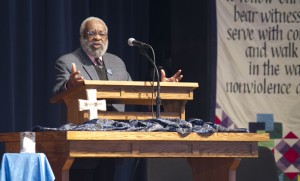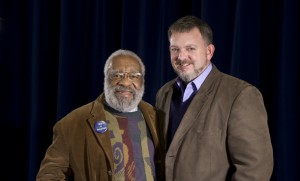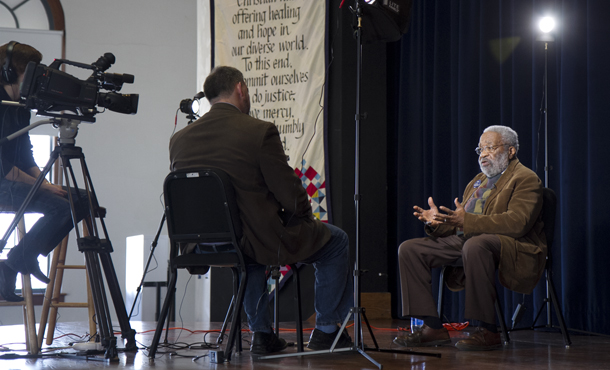More than 50 years after his first visit to campus, social activist and scholar Vincent Harding returned to EMU on Feb. 26 and 27, where he urged packed audiences to engage fully in the struggle to build a real participatory democracy based on justice, equality, sustainability and spiritual fulfillment, rather than on militarism, materialism and racism – or indeed on any form of discrimination.
Harding and his late wife, Rosemarie, were close friends and colleagues of Martin Luther King Jr., during an era when the Hardings were active members of a Mennonite church.
“I come as one who does not like to lecture or preach,” said Harding, during his remarks in chapel on the morning of Feb. 26. Characterizing his visit as a dialogue with everyone else on campus, he invited others’ feedback and thoughts throughout the next two days. “Loving dialogue is part of what keeps me going and keeps us going.”
That evening, Harding continued that conversation as part of the Albert N. Keim History Lecture series, when he spoke about America as an idea that hasn’t yet been fully realized.
“I am absolutely obsessed with the question of how you build a deep democracy in this country,” said Harding, who played an active leadership role during the Civil Rights movement and continues to work toward a more just, participatory society through his nonprofit organization, Veterans of Hope. He lives in Denver, Colo., where he was a professor of religion and social transformation at the Iliff School of Theology from 1981 until his retirement in 2004.

Helped MLK to articulate stance against Vietnam War
In the ’60s, Harding worked closely with King and other Civil Rights leaders, playing important behind-the-scenes roles in the movements to challenge segregation in Albany, Ga., and Birmingham, Ala. Harding also drafted King’s famous and highly controversial speech, “Beyond Vietnam: A Time to Break Silence,” delivered in New York City in on April 4, 1967, exactly one year to the day before King’s assassination.
In it King called for the U.S. to “undergo a radical revolution of values,” adding: “When machines and computers, profit and property rights are considered more important than people, the giant triplets of racism, materialism, and militarism are incapable of being conquered.” King also explicitly linked capitalistic socio-economic practices to the absence of “fairness and justice” both at home and abroad. This passage – evocative of current questions regarding the U.S.’s role in Iraq and Afghanistan – shows the strong stance and unequivocal language in that Harding/King speech:
True compassion is more than flinging a coin to a beggar; it is not haphazard and superficial. It comes to see that an edifice which produces beggars needs restructuring. A true revolution of values will soon look uneasily on the glaring contrast of poverty and wealth. With righteous indignation, it will look across the seas and see individual capitalists of the West investing huge sums of money in Asia, Africa and South America, only to take the profits out with no concern for the social betterment of the countries, and say: “This is not just.” It will look at our alliance with the landed gentry of Latin America and say: “This is not just.” The Western arrogance of feeling that it has everything to teach others and nothing to learn from them is not just. A true revolution of values will lay hands on the world order and say of war: “This way of settling differences is not just.” This business of burning human beings with napalm, of filling our nation’s homes with orphans and widows, of injecting poisonous drugs of hate into the veins of peoples normally humane, of sending men home from dark and bloody battlefields physically handicapped and psychologically deranged, cannot be reconciled with wisdom, justice, and love. A nation that continues year after year to spend more money on military defense than on programs of social uplift is approaching spiritual death.
Harding is the author or co-author of five books, including Martin Luther King – The Inconvenient Hero. In the 2009 edition of his book Hope and History, Harding called attention to “the continuing frontiers for justice, for community, for the redemption of the soul of our nation.”
Struggle still necessary for a more just, humane society
He wrote of the continued swamp of materialism, sexism, homophobia, and poverty, along with “antidemocratic, bullying military interventions of our government.” In order to “keep going toward a more just and humane society” we (the people) have to accept that there will be personal, fiscal and psychic costs. Yet by acting out of – and building upon – love, we will “receive the power to carry on the struggle.”
In Hope and History, Harding said he dreamed of a community-based “rainbow wedge,” which would be “a force for the creation of new political, cultural, ecological, and economic realities.”
At EMU, Harding explained that being “we, the people” means being active as citizens because, in the absence of this, our leaders will always be happy to step in and take things in self-serving directions.
In December 2013, Harding married another longtime peace and justice activist, Aljosie Aldrich Harding, who accompanied him on the visit to EMU. During classes and other discussion, Aljosie encouraged students to live their lives being primarily for, rather that against, things in order to promote change.
The Hardings’ EMU itinerary also included visiting an undergraduate African-American history class, a seminary class, speaking at a seminary chapel, and informal lunchtime conversations with students and faculty.
Harding’s ties with the Mennonite Church
Vincent Harding’s long association with the Mennonite Church began in the late ’50s, when he was studying for his doctorate at the University of Chicago and began attending Woodlawn Mennonite Church on the city’s south side. In 1958, five Mennonites – Harding, another African American man, and three white men – decided to travel through the South “to manifest and test our faith in Christian brotherhood.” Harding’s decade-long association with King began on this trip, when King welcomed the five men into his home, though he was in bed recovering from a stab wound.
In his book Martin Luther King – The Inconvenient Hero, Harding wrote:
Before we left, he [King] turned to Ed Riddick, the other African-American traveler, and to me, and he said, very seriously, “You Mennonites understand what we’re trying to do in this nonviolent movement. You ought to come down from Chicago and help us.” I never forgot the invitation, or the reasoning behind it.
Harding and first wife Rosemarie moved to Atlanta, Ga., in 1961 to lead a new, interracial voluntary service unit support by Mennonite Central Committee, where they lived around the corner from Martin and Coretta King. (Rosemarie was the first African-American woman to graduate from EMU’s sister school, Goshen College; she died in 2004.)
The following year, the Hardings visited EMU to talk about their involvement in the civil rights movement, and to challenge the broader Mennonite community to more active participation in the struggle for racial justice.
“It was easy for people scattered around [these] often-isolated Mennonite worlds to have only the weakest possible understanding of what was going on,” recalled Harding during his recent visit.
On being insensitive to the sin of racial prejudice
When the Hardings arrived in Harrisonburg in May, 1962, they were troubled by the EMU community’s lack of awareness about the extent of segregation in Harrisonburg itself and, as they later wrote in a report, “a frightening moral insensitivity to the sin of racial prejudice and discrimination.” The couple used the opportunity to challenge those on campus by presenting them with a series of questions, such as whether it was morally acceptable for Mennonite teachers to participate in segregated professional organizations, or whether “Mennonites should continue to take advantage of the false privilege of a pink skin by making use of facilities that are denied to their Negro brothers.”
“Before we left Harrisonburg, we felt that there were many individuals – students and adults – who were beginning to struggle deeply with the implications of discipleship in their situation,” the Hardings wrote later. Harding remained in contact with EMU as it began changing, visiting in the late ’70s at the invitation of Titus Bender (then a social work professor) and again in 1995 as part of EMU’s observation of Black History Month.
Titus and Ann Bender became friends with Harding when they led a Mennonite voluntary service unit in Meridian, Mississippi, from 1958 to 1969. Titus says Harding pushed him personally, and EMU collectively, to move forward in realizing that “nonviolence is not inaction” and that “one can work for creative change without being violent.” While the Hardings’ tough questions during their first visit caused some discomfort on campus at the time, the university’s eventual embrace of nonviolent social activism is reflected today by initiatives like the Center for Justice and Peacebuilding (CJP) and the undergraduate major in peacebuilding and development.
Harding inspired restorative justice pioneer Howard Zehr
Harding also was a major influence on Howard Zehr, who is regarded internationally as one of the founders of the field of restorative justice. Today Zehr is co-director of CJP’s Zehr Institute for Restorative Justice.

“I remember sitting at the dining room table with him as he patiently helped a naïve white boy understand racial injustice in this country,” said Zehr, referring to several visits Harding made to his family’s home and church in Indiana. Zehr subsequently enrolled in Morehouse College in Atlanta (MLK’s alma mater) and became its first white graduate in 1966. Harding “was a major factor in developing my consciousness and concern about justice,” Zehr said.
Reflecting on the recent visit, EMU history professor Mark Metzler Sawin said that Harding challenged and inspired the university, as he has been doing since he first came to campus more than 50 years ago.
“He reminds us again and again that we are the people we are waiting for. We are the ones who can make change happen,” Sawin said. “It is in our talking together that we are at our most human, and this sacred conversation is what makes us whole and helps move us toward the world that is yet to be – the world we want for our children.”
Choosing to identify with those who are oppressed
During the Feb. 26 evening event, Harding was asked how King, if still living, would assess our country’s progress toward the goals outlined in his famous “I Have a Dream” speech. Harding responded that King wasn’t expecting miracles. Simple solutions and quick fixes were never part of the plan. He recalled one of the most celebrated ideas King described in that speech, that someday his children would be judged by the content of their character, not the color of their skin.
“How do you get to know the content of a child’s character?” asked Harding, pointing out that King’s vision was itself a plea for greater engagement. Building the beloved community, he said, isn’t limited to passing new laws that, in theory, advance racial equality. Building that community means creating stronger connections and developing relationships across the racial divides that persist in our country.
In his last public presentation at EMU, a Thursday morning chapel at the seminary, Harding focused on these words of Martin Luther King Jr.
I choose to identify with the underprivileged.
I choose to identify with the poor.
I choose to give my life for the hungry.
I choose to give my life for those who have been left out of the sunlight of opportunity.
I choose to live for and with those who find themselves seeing life as a long and desolate corridor with no exit sign.
This is the way I’m going.
If it means suffering a little bit, I’m going that way.
If it means sacrificing, I’m going that way.
If it means dying for them, I’m going that way, because
I heard a voice saying, ‘Do something for others.’
All of Vincent Harding’s talks at EMU on Feb. 26 and 27 can be accessed online:
“Loved into Life: a personal testimony”
